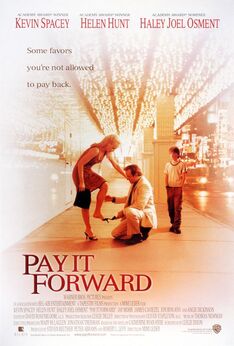
www.christiananswers.net/spotlight/movies/2000/payitforward.html
Trevor McKenney: “I think some people are too scared, or something (to pay it forward). I guess it's hard for people who are so used to things the way they are - even if they're bad - to change. 'Cause they kind of give up. And when they do, everybody kind of loses.”
If you identify yourself as a realist or a cynic, I will forewarn you: Mimi Leder’s Pay It Forward might just provoke an eye-rolling for the ages. Foolishly or otherwise, it’s screenwriter Leslie Dixon (loosely adapting Catherine Ryan Hyde's novel of the same name) believes wholeheartedly in the notion that humanity has the potential to overcome their most selfish, foolish, regrettable behaviour, and replace it with altruistic tendencies. In his review, Chicago Sun-Times critic Roger Ebert, responded to the film’s central conceit coldly, and with burst-your-bubble scepticism: “It's a seductive theory, but in the real world, altruism is less powerful than selfishness, greed, nepotism, xenophobia, tribalism and paranoia. If you doubt me, take another look at the front pages.”
Whilst I emphatically disagree with Mr. Ebert’s sentiments, I believe I understand why he responded in such a manner. Looking around us, you’d almost be forgiven for thinking that the world was irredeemable, that it had gone too far this time in its pursuit of evil. But for Christians such as myself, we live in the knowledge that there is a living hope – Jesus Christ, the One who can redeem and restore all things to right-living and relationship with their Creator. So, Mr. Ebert is correct to doubt, as humanity’s propensity for altruism fails when it works isolation. But when we call upon the One who is infinitely stronger than our greatest minds combined, asking for His help, He is able to give us the ability to live a life of selfless concern for the well-being of others. He gives us the ability to do something extraordinary: ‘pay it forward’.
Unbeknownst to him, Trevor’s actions help to form an ever-growing movement comprised of all the people who have been subsequently affected by Trevor’s decision to ‘pay it forward’. Originating in Las Vegas, Nevada, we watch as this trend of goodwill makes its way to Los Angeles, and even spreads to other areas of the country. It’s through coming into contact with Trevor, or spending time with him, that people are somehow moved to change their ways. Perhaps it’s due to the mere presence of an innocent, young boy, which reminds and encourages them to get back in touch with their own childlike virtues. But perhaps its simpler than that - these are people who find themselves inexplicably blessed, but in experiencing such undeserved favour, are moved to be a blessing to those around them. It’s because they spent time with someone who valued them, believed in them and knew they were destined for better, greater things.
In turn, Trevor’s movement (whilst unintentional), reminded me a great deal of Jesus’s intentional time upon earth. He began a movement, of sorts, which was embodied in his day-to-day ministry and subsequently became world-shaping. Jesus specifically chose to spend time with people, imparting upon them His Father’s teachings, encouraging them to turn from their sinful ways and be welcomed into relationship with Him – both in the present and eternal. In doing so, many He came into contact with were healed by Him, and, as a result, went on to speak about Jesus publicly (Mark 1:40-45), whilst others decided to follow Him (Matthew 20:29-34). Some even chose to follow directly in His footsteps, when Jesus called them to be His disciples. These men (‘the twelve’) were perfectly ordinary, but when they came into contact with Jesus and were saved by Him, they too went on to become makers and shakers in their regions, and throughout the ancient world. Take Peter for instance – a fisherman whom Jesus invested time and effort in, because He knew that Peter was destined to do greater things, proclaiming: “I will send you out to fish for people” (Matthew 4:19, NIV). Peter went on to speak about Jesus wherever he was sent, but upon one occasion, he spoke before a mass gathering, where “about three thousand were added to their number (or movement, if you will) that day” (Acts 2:40-42, NIV). Many were blessed and saved by Jesus. So, in turn, they decided to ‘pay it forward’ in tending to people’s physical needs, but also their spiritual, by proclaiming the Good News about salvation for all turn to Jesus.
The most distinct similarity between those who came into contact with Trevor and Jesus, was that none of them deserved the favour which was extended to them. Rather, they were offered unconditional favour and grace regardless of who they were, where they came from, or what they had done. And such actions even led to their redemption. But the act of Trevor extending such grace and mercy to those whom society would more than likely turn a blind eye to, is exactly what the Bible teaches that Jesus has done for humanity.
In fact, Jesus himself was “the Son of Man” who “came to seek and to save the lost” (Luke 19:10, NIV). He was sent to Earth over 2000 years ago, by His Father, God, the creator of the universe, to make a way to save all of those in need of redemption. Just like the broken and needy characters which populate Leder’s film, the Bible teaches that humanity too is in need of redemption. For the author of Romans 3:23 (NIV) writes, "For all have sinned and fall short of the glory of God”, which means that each and every one of us have been touched by the darkness of this world. We have chosen to do wrong in the eyes of God, succumbing to our own selfish desires over His, thereby excluding ourselves from a relationship with the God of the universe. All of us “…have wandered away like sheep. Each of us has gone his own (sinful) way.” (Isaiah 53:6, ICB). But as Leder’s film maintains, we are better than the worst thing we have ever done and can indeed be forgiven. How then is that possible?
The Bible teaches that Jesus “died for everyone”, “so that those who receive His new life will no longer live for themselves. Instead, they will live for Christ, who died and was raised for them” (2 Corinthians 5:15, NLT). This “means that anyone who belongs to Christ” will “become a new person”, for when we are friends of God, “The old life is gone; a new life has begun!” (2 Corinthians 5:17, NLT). But this was only made possible through the life, death and resurrection of Jesus Christ, who took the punishment that we deserved when He was crucified and died on the Cross. God wanted us to know just “how much he loves us”, that even “while we were still sinners” (Romans 5:8, GNT) and chose to live apart from Him, He made a way for us to be saved from “the wages of sin”, which “is (eternal) death” (Romans 6:23, NIV) - cut off from our Father in Heaven. We need no longer live in separation from Him, but enter into freedom with God today, by asking Him to forgive us of our sins, welcoming Him into our life and turning away from our old ways of living.
Sadly, Trevor’s life is tragically cut short in the film’s final act, and we see that many people come to pay their respects to the young man who inspired so many. It’s a painful moment, in an otherwise uplifting film. But it’s also where the Christ-figure comparisons (sort of) come to an end. Unlike Jesus, there is no miraculous triumph over death for Trevor. But in the film’s final shot, however, we witness many come to pay their respects at the family home – with many more on the way, lighting the streets with candles as they make their pilgrimage to the home. Thankfully, the movement doesn’t die with Trevor, it is lit brightly for all to see, and it reaches untold numbers of people. Something better, and more uplifting can be said for Jesus, however, who upon defeating the power of death, made a way for all to be redeemed and join his life-giving ‘movement’, led by the One who is alive and can reign in our hearts today. For in becoming a friend of Jesus we are blessed with a favour that we could never afford, but that we can always ‘pay forward’, in sharing His name globally, through the power of the Holy Spirit, who empowers us not to do “what your sinful nature craves”, but His will – which is to live a life without sin, and in service to Him.
Why not prayerfully invite a friend or family member who doesn’t yet know Jesus, to watch Pay It Forward for themselves? Use the film’s themes to ask them what they thought of the film, if they spotted any links to Christianity and what they might think of the Gospel’s response to this subject.
If you feel able to, ask them what they think about Trevor’s noble idea to ‘pay it forward’ – would it be a feasible, effective movement in our everyday life? Or do you think that people might laugh at the idea? Prompt them to consider the notion of showing someone favour, regardless of whether they deserve it or not. Is it a foolish thing to do? Go on to breach the subject of Jesus and His undeserved gift of grace which He lovingly showed to us, unconditionally. What do they think about that? If it’s real, is that something worth ‘paying forward’? Later, if they're open to hearing it, take an opportunity to share the hope of the Gospel message with them, mentioning the fact that we have the opportunity to receive the gift of salvation in Jesus today – even though we don’t deserve it. Invite them, if you feel prompted by God, to consider accepting Jesus into their life today.
Prior to watching the film for yourself, however, take a moment to pray that God would speak to you through the film. If you feel comfortable, pray this prayer over all of your future, film-watching experiences:
Dear Lord, as I watch this film, I ask that you would be present here with me. Highlight to me anything within it that is honourable, anything that can be used in conversation for your Kingdom purposes. Amen.
Pay It Forward is available to rent through Amazon Prime Video and Apple TV (in the UK).




 RSS Feed
RSS Feed